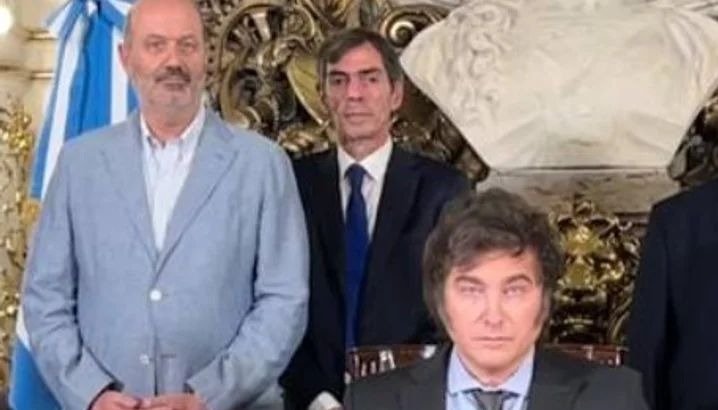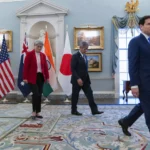
Federico Sturzenegger It has already been confirmed by both Javier Milei and the recently assumed Chief of Staff, Guillermo Francos, to join the Executive. After six months as a shadow advisor, they will create a charge especially for him. “Federico Sturzenegger is going to join the national Cabinet as a minister,” said Francos. In what role? The name has not yet been defined, but it will be “in an area that has to do with economic deregulation“.
Everything indicates that the former official of Me too, From the Street y Macri have control of the Secretary of State Companies and Companiescurrently in the hands of Mauricio González Botto, man of the resigned Posse. The “economic deregulation” initiated in the DNU and the Bases Law promoted by it is nothing other than the privatization and “reorganization” plan of public companies. Companies like Argentine Airlines, Correo Argentino or Aysa They would be in their orbit.
His entry into the cabinet occurs in the middle of a political crisis in the Government, the failure of the May Pact and the problems of Milei’s management to approve the so-called Bases Law. Close to Milei and praised by him for his liberal orientation, the formal entry into the Executive had been anticipated last week by Milei, although it had been subject to the approval of the Law in Congress. Finally, the changes were brought forward: Francos will replace Nicolás Posse at the head of the Cabinet, and the Ministry of the Interior will cease to exist as such for its dehierarchy to a secretariat, which would be in charge of Lisandro Catalán.
Who is Federico Sturzenegger
Sturzenegger is not someone new to the political regime but has held different positions since the 1990s. A typical character of “the breed”. First how YPF official in the mandate of Carlos Menem, in the middle of the privatization process of energy companies and shortly before the transfer of the company to the Spanish company Repsol. He then occupied the Secretariat of Economic Policy during the government of Fernando De La Rúa, in 2001from where another chapter of public debt was carried out with the “megacanje“, a fraudulent operation carried out in complicity with Domingo Cavallo that, among other things, ended in the December 2001 crisis.
In his role as an official, he was also president of the Central Bank between 2015 and 2018, during the government of Mauricio Macri, from where he did not deprive himself of guaranteeing large businesses for big businessmen, speculators and the real estate lobby, and against the working people. From there he carried out a contractionary monetary policy to seek to discipline the working class through “market” mechanisms: destroying hundreds of thousands of jobs and devaluing wages.
Later, the Central Bank guaranteed the architecture of the “financial bicycle” with the Lebac (Central Bank Letters) through which the mechanism of the large employers’ associations of “borrowing and fleeing” was oiled thanks to high interest rates and mobility. of capitals. In the first months of 2018 The Central Bank lost almost US$ 15 billion in reserveswhere large investment banks benefited, such as JP Morgan, which obtained enormous speculative profits by switching to the dollar.
Also since his time at Central he devised the UVA mortgage loan scam, which many families still suffer today and which Milei’s management is trying to relaunch. In favor of the real estate lobby, he promoted in the DNU the repeal of the rental lawas well as an endless number of market “deregulation” modifications that gave way to price remarking and inflation.
Before that he was also president of Banco Ciudad de Buenos Aires between 2008 and 2013, and national deputy (PRO). In the last elections he was a campaign advisor to Patricia Bullrich and from there he strengthened her bond with Milei. In the last six months he was the main person responsible for the main anti-worker reforms of the Government, creator, together with large economic groups such as Techint and Corporación América, of the mega DNU 70/2023 of deregulation of the economy and the drafting of the Bases Law, both the first failed attempt like the project currently being discussed in the Senate.
Deregulate and privatize
“I don’t have the name, we are going to discuss it with the president, the function is going to be deregulation. It is important that someone who looks at deregulation globally,” Francos celebrated the imminent arrival of Sturzenegger, whose task until now he described of “titanic”. Along with him will arrive another former official of the Macri administration, the economist Lucas Llach, who was his vice president at the Central Bank. Between them, they starred in the failure of the “inflation goals” in 2018 and his departure from the entity, replaced by Luis Caputo, with whom he continues to have a confrontation.
If the above is confirmed, they will be in charge of a large part of the public companies and the treatment they will have, promoting privatization wherever they can to guarantee friendly businesses. Although since the first version of the Omnibus Law the list of state companies to be privatized was considerably reduced, there are still some very important ones under the spotlight.
The first list had the objective of sweeping away 41 state companies, the average sanction that came from Deputies includes 9 companies. Four with the category of ““total privatization”: Aerolíneas Argentinas, Enarsa, Radio and Television Argentina and Intercargo. AND another five as possible to be concessioned: Aysa, Correo Argentino, Belgrano Cargas, Corredores Viales and Sociedad Operadora Ferroviaria (Sofse).
Other companies like Telamthe General Administration of Ports (AGP) y Arsat They were removed from the list, but without specifying their fate. In the case of AGP, at the end of the year, the new tender for the Paraná-Paraguay Waterway.
If the Base Law is not approved or the privatization chapter fails, Sturzenegger would be in charge of the continuity of scrapping of public companies through auditors appointed by the government.
In the case of Aysaits staff was reduced by 800 employees, 600 due to voluntary retirement and 200 with layoffs, out of a total of 7,400; Argentinian airlines Air routes have already been eliminated and ground personnel have been reduced through voluntary retirements, while progress has been made with layoffs, especially in outsourced companies such as GPS, resisted by their workers. In it Argentine Mail Staff was reduced by 20 percent, with 2,000 voluntary retirements and 1,100 non-renewed contracts. At the news agency Telamits 700 workers remain on furlough since the closure was announced at the beginning of March, with an open voluntary retirement plan.
In the case of the energy companies (Enarsa, Cammesa, Yacimientos Río Turbio, YPF) and transportation companies (Belgrano Cargas, Ferrocarriles Argentinos), they fell under the orbit of Luis Caputo’s Economy.
Source: www.laizquierdadiario.com

